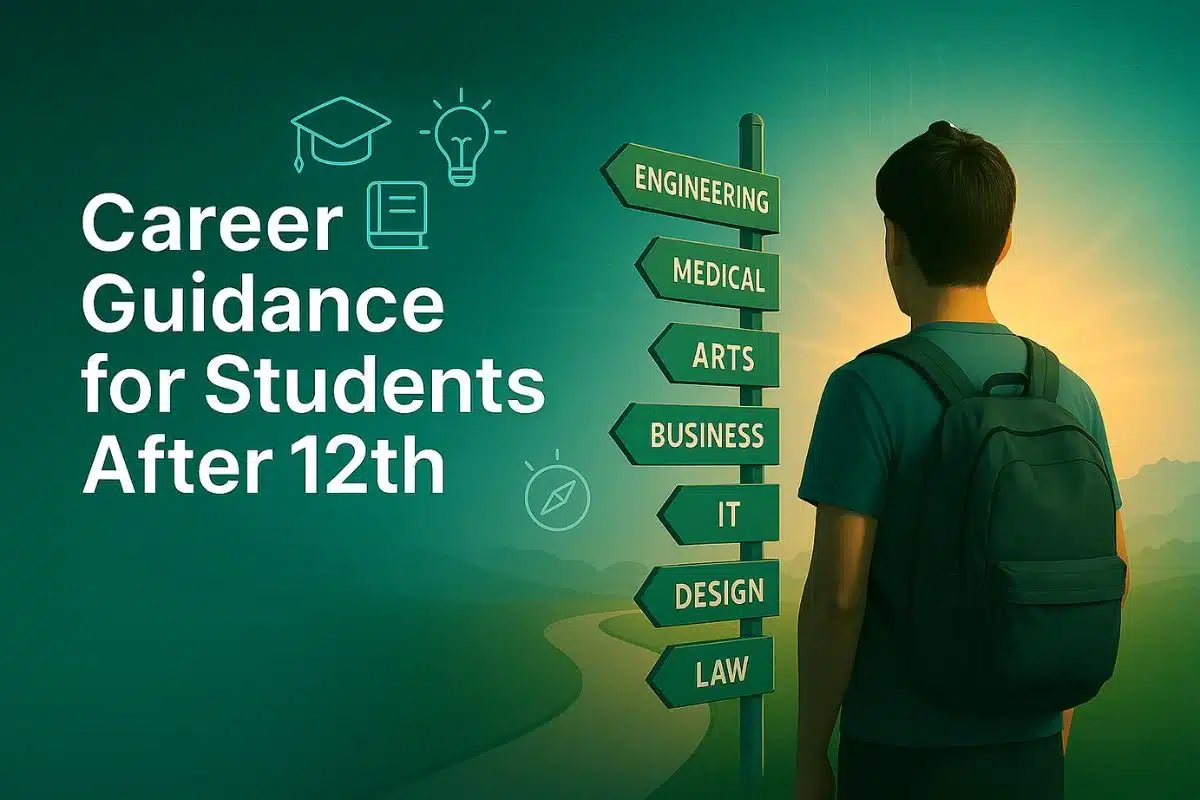The completion of the 12th standard is often considered a crucial milestone. It marks the end of school education and the beginning of a more focused journey towards a professional career. However, this transition can be challenging. With countless courses, career options, and future possibilities, students often feel overwhelmed. This is where career guidance for students after 12th becomes invaluable.
Proper career guidance can help students make well-informed choices aligned with their interests, skills, and market demand. Without it, many students end up confused or pressured into decisions that don’t suit them, resulting in dissatisfaction or wasted time and resources. In this blog, we will provide an in-depth roadmap to help you understand, explore, and decide the best career path after your 12th board exams.
1. What is Career Guidance and Why is it Important After 12th?
Career guidance is a systematic process that assists students in understanding their capabilities, interests, and potential career paths. It includes self-assessment, exploring education and job options, and getting professional advice.
Importance of Career Guidance for Students After 12th
-
Clarifies Confusion: Helps reduce anxiety by providing clear options.
-
Aligns Interest and Skills: Matches your strengths and passions with suitable careers.
-
Saves Time and Money: Avoids wrong career choices that lead to dropout or switching fields.
-
Improves Success Rates: Increases chances of academic and professional success.
-
Boosts Confidence: Provides motivation by setting achievable goals.
2. Understanding Different Career Streams After 12th
One of the first steps in career guidance is knowing the traditional and emerging streams available to you after 12th. The choice usually depends on the stream studied in school—Science, Commerce, or Arts—but there are exceptions.
Science Stream
The science stream is typically chosen by students interested in technical and research fields. It splits into two major groups: PCM (Physics, Chemistry, Mathematics) and PCB (Physics, Chemistry, Biology).
Popular Career Options
-
Engineering: Mechanical, Civil, Computer Science, Electrical, Aerospace, Biotechnology, etc.
-
Medical and Healthcare: MBBS, BDS, Nursing, Pharmacy, Physiotherapy, Biotechnology, etc.
-
Pure Sciences: B.Sc. in Physics, Chemistry, Mathematics, Environmental Science, etc.
-
Computer Applications: BCA, Data Science, Artificial Intelligence, Cybersecurity.
-
Research and Academics: Pursue M.Sc, Ph.D. for scientific research roles.
Commerce Stream
Commerce stream is best suited for students interested in business, finance, and trade.
Popular Career Options
-
Chartered Accountancy (CA)
-
Company Secretary (CS)
-
Cost and Management Accountant (CMA)
-
Bachelor of Commerce (B.Com) with specializations like Accounting, Finance, Taxation, Auditing
-
Business Administration: BBA, BBM
-
Economics and Banking
-
Actuarial Science
Arts/Humanities Stream
Arts or Humanities stream opens doors to creative, social, and legal professions.
Popular Career Options
-
Law: LLB after 12th or after graduation
-
Journalism and Mass Communication
-
Psychology, Sociology, Political Science
-
Fine Arts, Fashion Design, Interior Design
-
Social Work and Public Administration
-
Languages and Literature
3. Emerging Career Options: Beyond Traditional Streams
The world is evolving, and new careers are being created constantly. Students need to be aware of these emerging fields to stay ahead.
| Career Field | Description | Popular Courses |
|---|---|---|
| Data Science & Analytics | Extract insights from big data to solve problems | B.Sc Data Science, M.Sc Data Analytics |
| Artificial Intelligence & Machine Learning | Develop intelligent systems and automation | B.Tech AI, Certification Courses in AI/ML |
| Digital Marketing | Promote brands online through various digital channels | Diploma/Certification in Digital Marketing |
| Cybersecurity | Protect digital information and networks | B.Tech Cybersecurity, Diploma in Cybersecurity |
| Environmental Science | Work on sustainability and environmental protection | B.Sc Environmental Science, Renewable Energy Courses |
| Content Creation & Multimedia | Animation, Video Editing, Graphic Design | BA Multimedia, Diploma in Graphic Design |
| E-commerce Management | Manage online businesses and platforms | Diploma in E-commerce, MBA in E-commerce |
| Healthcare Technology | Use technology for better healthcare solutions | B.Tech Biomedical Engineering, Health Informatics |
4. How to Choose the Right Career Path After 12th: A Step-by-Step Guide
Choosing the right career path can be simplified if you follow these practical steps:
Step 1: Self-Assessment
-
Identify your strengths, weaknesses, and interests
-
Take career aptitude and personality tests to understand your natural inclinations
-
Reflect on hobbies, favorite subjects, and tasks you enjoy
Step 2: Research Career Options
-
Explore various streams, courses, and job roles
-
Look into future growth prospects and salary trends
-
Understand the educational and skill requirements
Step 3: Seek Professional Career Counseling
-
Meet qualified career counselors for personalized advice
-
Discuss your aspirations, doubts, and preferences
-
Attend career workshops and seminars
Step 4: Set Short-term and Long-term Goals
-
Define your immediate academic goals (which course, which college)
-
Plan for long-term objectives like industry, specialization, and career growth
Step 5: Take Action
-
Apply for relevant courses or entrance exams
-
Participate in internships, workshops, and online courses to build skills
-
Network with professionals and alumni for insights
5. Role and Benefits of Career Counseling for Students
Career counseling plays a vital role in guiding students through this critical phase.
What Does Career Counseling Involve?
-
Aptitude and interest assessments
-
Career exploration based on results
-
Information about education paths and job markets
-
Emotional and psychological support
-
Planning academic and career goals
Benefits
-
Helps reduce stress and anxiety about future choices
-
Counters peer and parental pressure with logical advice
-
Provides access to expert knowledge and resources
-
Empowers students to take ownership of their career decisions
6. Top Courses to Consider After 12th: Detailed Overview
Here’s a detailed list of popular courses across streams that are trending and valuable.
| Stream | Course Name | Duration | Career Prospects |
|---|---|---|---|
| Science | B.Tech (Engineering) | 4 years | Software engineer, civil engineer, etc. |
| MBBS (Medicine) | 5.5 years | Doctor, Surgeon, Medical Researcher | |
| B.Sc in Computer Science | 3 years | Programmer, Data Analyst | |
| Commerce | B.Com (Accounting, Finance) | 3 years | Accountant, Auditor, Financial Analyst |
| CA (Chartered Accountancy) | Varies | Accountant, Tax Consultant | |
| BBA (Business Administration) | 3 years | Business Manager, Marketing Executive | |
| Arts | BA in Psychology | 3 years | Counselor, HR Professional |
| LLB (Law) | 3 years after graduation | Lawyer, Legal Advisor | |
| Vocational | Diploma in Digital Marketing | 6 months-1 year | SEO Specialist, Social Media Manager |
| Diploma in Animation | 1-2 years | Animator, Graphic Designer |
7. Tips for Effective Career Planning After 12th
Start Early and Stay Curious
The sooner you start exploring careers, the better. Research various industries and roles.
Build Relevant Skills
Along with academics, develop soft skills like communication, leadership, and critical thinking.
Take Advantage of Internships
Hands-on experience can provide clarity about what you enjoy and are good at.
Stay Updated with Market Trends
Some careers may evolve or become obsolete; adaptability is key.
Network and Seek Mentorship
Connect with professionals for guidance and insights into real-world scenarios.
8. Common Challenges Students Face and How to Overcome Them
Challenge 1: Confusion About Career Options
Solution: Use career guidance tools and counseling to narrow down choices.
Challenge 2: Peer and Parental Pressure
Solution: Communicate openly with family, involve counselors, and make informed decisions.
Challenge 3: Lack of Awareness About New Careers
Solution: Stay informed through workshops, webinars, and online courses.
Challenge 4: Fear of Making Wrong Decisions
Solution: Remember, career changes are possible, but a thoughtful start helps reduce risks.
Also Read - Best Self Improvement Books to Read for Free
9. FAQs on Career Guidance for Students After 12th
Q1: What is the best way to get career guidance for students after 12th?
A: Combining self-assessment tools with professional career counseling is the best way to get personalized and effective guidance.
Q2: How important is career counseling after 12th?
A: Very important, as it provides clarity, reduces stress, and aligns your strengths with suitable career paths.
Q3: Can I change my career after choosing one post-12th?
A: Yes, many people switch careers. However, choosing carefully initially saves time and resources.
Q4: Are vocational courses valuable after 12th?
A: Yes, vocational courses provide practical skills and faster entry into the job market.
Q5: How can I explore new and emerging careers?
A: Attend industry webinars, follow career blogs, and take introductory online courses in fields like AI, digital marketing, and data science.
Conclusion
Career decisions after 12th are undoubtedly significant, but with the right guidance and information, you can choose a path that aligns with your passion and market demand. Remember, career guidance for students after 12th is not just about picking a course; it’s about understanding yourself, exploring your options, and planning your future smartly. Take your time, seek advice, and stay adaptable. If you found this guide helpful, feel free to share it with fellow students or leave your questions in the comments. Your career journey is unique—make it count!



